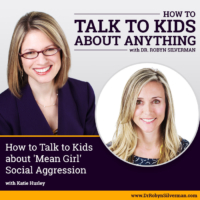Podcast: Play in new window | Download
Subscribe: Apple Podcasts | RSS | More
How to Talk to Kids about Sports & Competition
This podcast focuses on children and sports. Dr. Ross Flowers, director of sports and performance psychology for the LA Clippers, discusses the benefits of sports, how parents can support their children who are in sports and how to talk to kids about burnout, diversifying, sportsmanship and quitting. He also gives some warnings about when sports can go in the wrong direction for children. Dr. Flowers gives many tips for parents so that they can help raise healthy, balanced, happy athletes.
Special Guest: Dr. Ross Flowers
Sports can be an incredible opportunity for children to gain and develop physical skills, learn how to be a  member of a team, get the exercise that is recommended for their growing bodies, make dear friends and improve confidence along the way. Of course, sports can have a downside if there is too much pressure on kids to win, be the best and cram more and more into their already tight schedules. So we are going to speak with an expert in children and sports to make sure we maintain some balance, gain the benefits and keep some of the win-at-all-costs consequences at bay.
member of a team, get the exercise that is recommended for their growing bodies, make dear friends and improve confidence along the way. Of course, sports can have a downside if there is too much pressure on kids to win, be the best and cram more and more into their already tight schedules. So we are going to speak with an expert in children and sports to make sure we maintain some balance, gain the benefits and keep some of the win-at-all-costs consequences at bay.
Ross Flowers, Ph.D. is an experienced sport and performance psychologist, executive coach, author and speaker. He is the director of sports performance psychology for the LA Clippers. As a partner in Giles Consulting Group he has worked as a leadership development coach for the Center for Creative Leadership, international sport psychologist, psychologist in the California Department of Corrections and Rehabilitation, and sport psychology instructor. Ross is the author of Introducing Your Child to Sports: An Expert’s Answers to Parents’ Questions about Raising a Healthy, Balanced, Happy Athlete.
Ross served as a senior sport psychologist for the United States Olympic Committee, and was a member of many USA World Cup, World Championship and Olympic teams for summer and winter sports. Ross founded and directed the Applied Sport Psychology Program at the University of California, Davis. You can look him up right here
The podcast provides:
- Why parents should encourage children to get involved in sports.
- The messages we want to send to our children when they play sports.
- Tips: How parents can support children who are involved in sports.
- What to do when your child says s/he wants to quit.
- Scripts: What to say when your child wants to start a sport in terms of commitment, investment and sacrifice.
- How to talk to kids about good sportsmanship, burnout and specializing.
Important Messages:
- Sports is a great outlet. They can run freely, play freely, learn about their bodies, develop agility, balance and coordination as well as social learning—learning about themselves as well as how to work with other kids.
- Sports allows kids to develop their ABCs: Agility, Balance and Coordination.
- Many parents put too much pressure on their children when in sports—to be more or do more. The sport becomes the interest and passion of the parent- not the child. We’ve got to dial that back.
- Look at your schedules—can you take your child to the sport?
- Don’t: Critique the child during or after the sporting experience. Don’t critique over the coach.
- Cheer on your child no matter what the outcome.
- Make sure to have an agreement when your child expresses that s/he wants to start a sport than you finish what you start (barring extenuating circumstances that would prevent the child from being able to finish).
- Don’t allow your child to skip the practices and then play in the games.
- Make sure you pick a program that stresses skills and fundamentals and social elements or being part of a team.
- Ensure balance- how much time is a child spending in sports vs just being a kid.
- Make sure kids diversify rather than specialize at an early age. Allow them to diversify their skills.
- Give your children experiences in both individual and team sports.
- The sport you did as a child may not be the sport your child decides s/he likes.
- Don’t base sport choice on gender- kids should do whatever they like!
Notable Quotables:
- “Sports allows kids to develop their ABCs: Agility, Balance and Coordination.”
- “First and foremost, we have to remember that sports is about the child and what is in their best interest—not our own, as parents.”
- “Many parents put too much pressure on their children to do more and be better. Then the sport becomes the interest and passion or the parent- not the child. We’ve got to dial that back and remind ourselves what is best for the child and what they want. With that reminder, hopefully our children can be healthier and more balanced in their sport experience.”
- If you want to know how best to support your children in sports, “start with a healthy conversation about the children in sports. Ask them, what is best for you? What will help you the most?”
- “The more parents can be that positive sounding board, just listening, being there for support and encouragement is sometimes all a kid needs.
- “In sports, a lot of the learning and development comes through practice. Kids can learn about how to play the sport but also but how to develop friendships and relationships, gain social understanding and awareness and how to be responsible and disciplined.”
- “Parents need to remind themselves that these are kids in sport…If we keep pushing, the likelihood of burnout is much higher or the likelihood of getting injured is much higher. It also takes away some of the enjoyment of sports.”
- “Too often parents and coaches are pushing kids to go after that scholarship that we are forgetting they are still kids. We need to ask ourselves, are these kids really developing and maturing as young men and women and not just that next great athlete?”
- “Make sure your child is a great individual first—focusing on fundamental core values, morals and beliefs so the child has a solid and firm foundation to grow from. And as that becomes their foundation, now they can start looking at the skills that can go into a sport.”
- “At younger ages, kids should diversify their talents and their ability to grow and mature just like they do in school. If we just put our kids in math class, what kind of students would they be? The same goes for sports. Allow kids to develop well-rounded skill sets.
- “Many times, when the attention and focus is taken away from play and instead is made to be about competition, it’s not so much about the child. It becomes more about the parent and the coach. That’s when we need to redirect and ask; what is in the best interest of the child?”
- “I think it’s great for girls and boys to explore any sport they want. It does our children a disservice to cater to one sport or another based on gender.”
- “As children pursue their interest in sport, parents need to keep reminding themselves, keeping it in both the forefront and the backdrop of their minds, that it’s about their child’s interest—not their own.”








